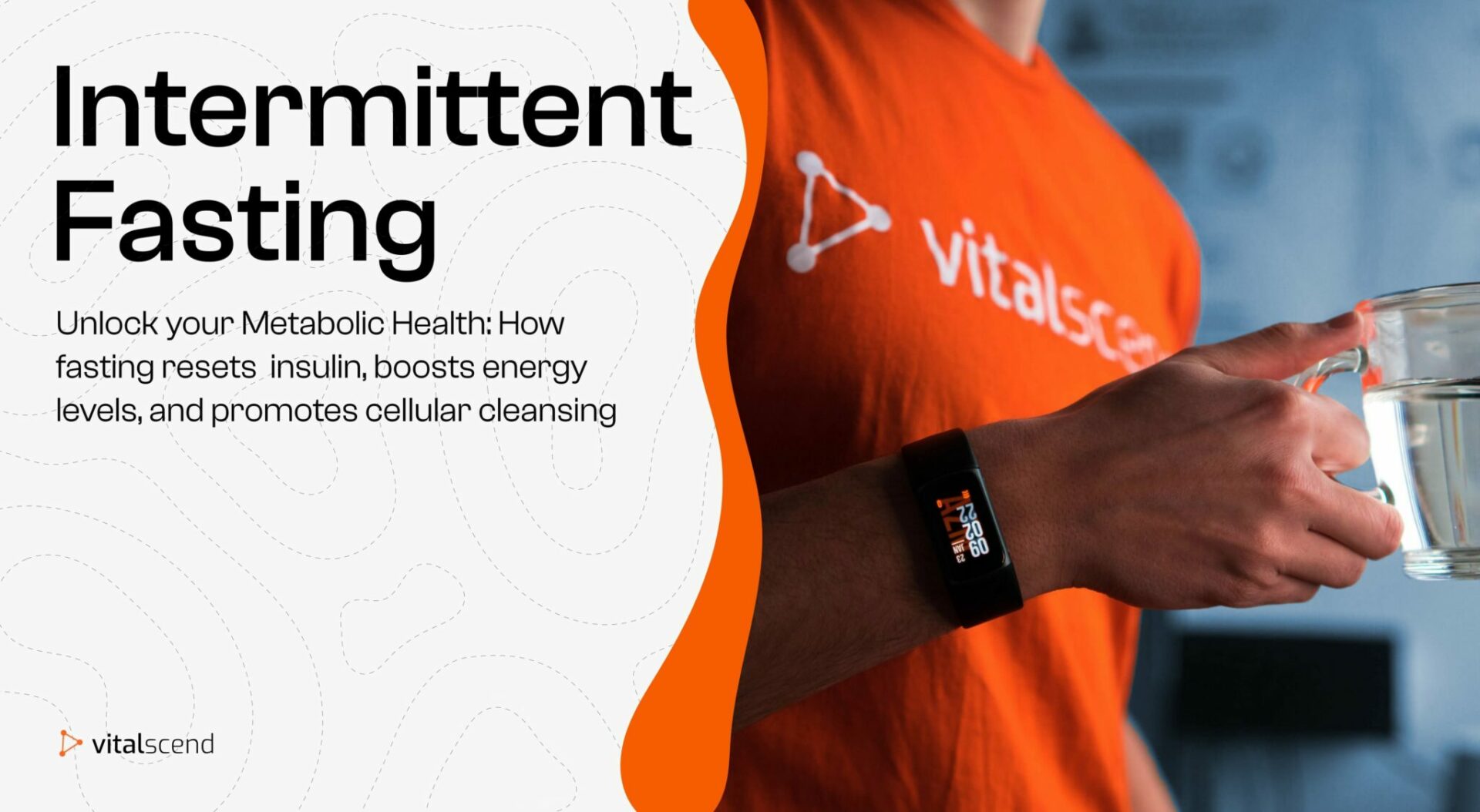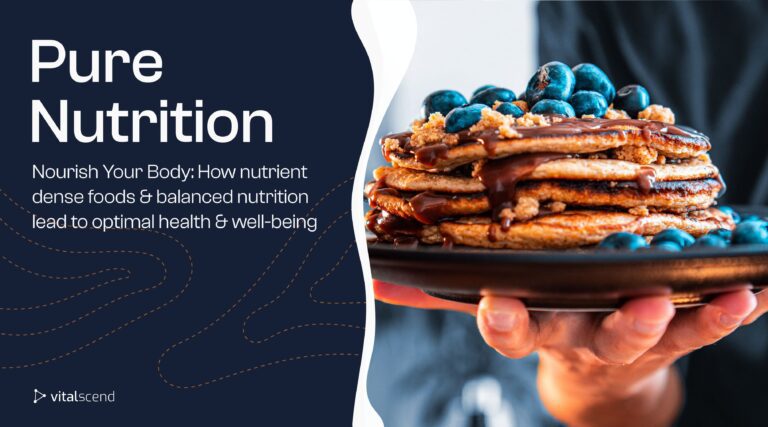Intermittent Fasting 101: Unlock Your Metabolic Health
Fasting. The most popular dieting approach based on extending the non-eating window. It’s meant to put our bodies in a fasted state, known to offer numerous benefits on metabolic health, energy increase, longevity, cognition, and weight loss.
From explaining how fasting works on a cellular level to its most potent benefits and different types of fasting, we cover it all. This is your Fasting 101 spot. You’ll finally learn what breaks a fast, and whether keto is superior to fasting. Enjoy!
What is Fasting?
Fasting is extending the non-eating window while restricting the eating window. The most common type of fasting is the 16:8 fasting model, the so-called intermittent fasting. It seems that 16-hour food breaks help reset our metabolism, leading to greater health and wellness.
The human body is in either a fasted or fed state. Reducing the eating window consequentially increases fasting duration. When we fast, numerous adaptations on a cellular level are induced which help our body hit the reset button.
Fasting and Health: How Does it Work?
Many metabolic health advantages can occur due to fasting. Such include improved insulin sensitivity, glycemic control, weight loss, and cholesterol profile. (1) (2) (3) (4) (5) Fasting is a preferred approach for preserving general health and wellness because of its many advantages.
The mechanism of fasting is similar to that of a ketogenic diet. When deprived of sugar, the body is forced to use fats as its primary fuel source, which promotes metabolic flexibility. This improves energy efficiency as the body can shift to ketones as an alternative source of energy.
Most benefits associated with fasting are linked to its catabolic nature. In other words, for all things that have to do with breaking down molecules, such as fat loss, toxins, or plaque removal – fasting has your back.
Fasting induces autophagy, a self-preservation mechanism that helps remove dysfunctional cells and misfolded proteins. Autophagy is another catabolic phenomenon heavily associated with longevity, anti-aging, and greater vitality.
Conclusion
When in a fasted state, the body burns fat (ketones) as fuel for energy, resetting our insulin levels while stimulating fat loss. It enhances mitochondria function, boosts energy creation, and helps the body reset. A cascade of catabolic effects occurs, leading to an enhanced regeneration ability.
Fasting and Health: How Does Fasting Work?
Fasting is an increasingly popular phenomenon. It is about extending the no-eating, so-called fasting window. This…
What breaks a fast?
There are several foods and beverages that do not break a fast. We’re talking 0 calories, so no sugar or creamers added. Drinks that can be consumed without breaking a fast include clean black coffee, water, and green tea. Additionally, fats interfere with (break) a fast less than carbohydrates do.
What is Intermittent Fasting?
Intermittent fasting is an eating regime that respects fasting for an extended amount and eating in a restricted time window. A great example is the 16:8 fasting, where people fast for 16 hrs and eat for 8 hrs.
How Does Fasting Work?
Fasting mainly works by depriving the body of sugar for an extended period, thus burning fat which enhances metabolic flexibility and resets insulin levels. Longer fasts are known to stimulate autophagy, a self-preservation mechanism where the body breaks down dysfunctional cells.
What are the Benefits of Intermittent fasting?
The benefits of intermittent fasting include weight loss, improved insulin sensitivity, reduced inflammation, enhanced brain function, increased lifespan, and potentially a reduced risk of chronic diseases such as heart disease and diabetes.
7 Benefits of Intermittent Fasting
The benefits of intermittent fasting extend far beyond weight loss. Fasting can enhance our function on a deeper, cellular level to positively affect energy, health, and vitality.
- HGH Increase – growth hormone is a vital hormone for weight loss, regeneration, and anti-aging, produced in greater quantities during fasting. It is the master hormone for regeneration, stimulating cellular repair, which exerts anti-aging effects. (6)
- Weight Loss – By encouraging favorable effects on glucose metabolism, glycemic management, and insulin function, fasting can accelerate weight loss and fat loss. Also, it puts the body in a practical caloric deficit of 10% and 30%.
- Insulin Sensitivity – Fasting can improve insulin sensitivity and blood sugar control by reducing meal frequency. The lower the glucose variability the more time insulin has to reset. This can improve several aspects of metabolism, the key one being lowering glucose fluctuations. (7)
- Promotes Autophagy – Fasting promotes autophagy, which is a self-preservation mechanism for longevity, anti-aging, and cellular cleansing. This biological mechanism aids in the elimination of toxins, plaque, damaged cells, and malfunctioning structures.
- Lower Inflammation – Intermittent fasting and calorie restriction can both reduce inflammation and oxidative stress. Less oxidative stress and DNA damage may result from consuming carbohydrates less frequently or being in a caloric deficit.
- Disease Prevention – By boosting HGH production, reducing inflammation, and improving insulin sensitivity, fasting may help prevent a number of diseases. Synergistic effects which occur due to fasting may contribute to a healthier environment in the body, less susceptible to illness development.
- Neuroprotection – Fasting may increase alertness and protect the brain by enhancing the brain’s ability to shift to ketones, a cleaner energy source that boosts mental alertness. Plus, it can raise Orexin levels, which encourages wakefulness, improves cognitive performance, and protects against neurodegeneration.
7 Effects of Intermittent Fasting on Health, Aging, Fat Loss and Cellular
Intermittent fasting is one of the most popular trends in the health & wellness industry. From…
Types of Fasting: 16:8, 5:2, ADH
16:8 Fasting
5:2 Fasting
ADH Fasting
Longer Fasts
The 16:8 fasting model is eating for 8 hours and fasting for 16. The most practical and sustainable method for many, which prefer eating from 12 to 8 PM. In addition to being effective at promoting fat reduction, improving glycemic control, insulin sensitivity, and metabolic health, it also tends to be more adhered to by individuals. The 16:8 model can promote hormonal health and control the circadian rhythm by maintaining regular eating patterns.
The 5:2 fasting goes beyond the advantages of the 16:8 model while being a more shocking and aggressive eating plan with a focus on longevity. It is done by eating normally for 5 days, and taking 2 days off by eating <25% of total calories on fasting days.
Alternate day fasting (ADF), another fasting method which involves eating normally one day and limiting calorie intake at fewer than 25% of total calories the next day. It has been demonstrated that this dietary pattern encourages weight loss, enhances insulin sensitivity, and lowers inflammation. ADF has also been linked to better cardiovascular health indicators, including lower blood pressure and cholesterol levels.
Long-term fasting of this kind promotes autophagy, which has powerful anti-aging, regeneration, and longevity benefits. It resets insulin, enhances metabolic flexibility, and lowers inflammation, all of which have positive effects on general health and well-being.
Fat Loss, Metabolic Health, Glycemic Control
Fasting is an incredibly potent tool for improving fat loss, metabolic health, and glycemic control, which are all crucial for optimal cellular energy production. The more efficient our energy production machinery is, the less we need to eat and the more we can move.
Fat Loss – The practicality of fasting lies in the caloric deficit it creates, which accelerates fat loss and offers additional benefits. Such include reducing inflammation, regulating fat mass, and improving metabolic risk factors. It’s an effective tool that makes caloric deficit easier to sustain. (3)
Metabolic Health – Fasting is an exceptional strategy for optimizing metabolic health as it reduces inflammation, boosts energy creation, and enhances glucose utilization. As glucose levels drop during fasting, insulin levels can reset as the body is encouraged to start using fats for fuel. By increasing levels of the beneficial HDL and lowering levels of detrimental LDL cholesterol and triglycerides, fasting can also improve cholesterol profile. (8)
Glycemic control – Fasting also offers a variety of advantages for glycemic control. It’s known to be effective in lowering fasting blood sugar levels and increasing insulin sensitivity. Furthermore, it aids in the control of hunger hormones like leptin and adiponectin, which makes it simpler to maintain a healthy weight. (4)
Conclusion
Fasting has synergistic effects which can result in greater metabolic health. By putting the body in a practical caloric deficit it supports weight loss. By reducing glucose variability, it improves glycemic control. By extended glucose deprivation, it gives time for insulin levels to reset.
Fasting for Fat Loss, Metabolic Health, and Glycemic Control
Fasting can be quite an effective tool for fat loss, metabolic health, and glycemic control. All…
How does fasting improve metabolic health?
By lowering blood glucose levels, increasing insulin sensitivity, and reducing insulin resistance, fasting has been shown to promote metabolic health. It may also result in a reduction in body fat, which is linked to better metabolic health.
What are the different types of fasting?
There is the Intermittent fasting model, like 12-12, 16-8, or 20-4 hours. There’s also ADH or alternate day fasting, and there are the 5:2 days fasting. For the last two, on the “fasting days”, fasters eat <25% of the calories they normally would during an “eating day”.
Can fasting help with weight loss / fat loss
Yes, fasting can be an effective tool for weight loss. By restricting the hours or days in which one can eat, it can create a caloric deficit which leads to weight loss.
What is Autophagy and How Does it Work?
Autophagy is a biological self-preservation mechanism stimulated by our body to combat cellular dysfunction. It is a highly intricate and finely-tuned process that allows us to recover, regenerate, and replace damaged structures within our cells. (9) (10)
Functioning as an internal recycling system, autophagy works tirelessly to create space for better, newer, and more functional cells. It helps flush toxins out, replace misshapen proteins and dysfunctional cells, effectively purging them out of our system.
Fun Fact
It comes from the Greek words auto meaning self, and phagein meaning to eat, hence why it’s self-eating. The process of autophagy results in the formation of autophagosomes, vesicles with double membranes which transport dysfunctional proteins to lysosomes that break them down.
To induce autophagy, one can adopt a variety of techniques such as fasting for 16-18 hours, following a keto diet, drinking black coffee, and engaging in regular exercise. Certain phytonutrients found in foods like garlic, olive oil, reishi, turmeric, chaga, and cinnamon are known to assist as well.
Autophagy promotes cellular cleansing, which is like a deep clean for the body. Aside from the breakdown of dysfunctional cells, it reduces oxidative stress, DNA damage, and inflammation.
It promotes neuroprotection and neurogenesis, enabling our brain to function at its best, as it aids neural repair. Perhaps most impressively, autophagy is thought to promote longevity and anti-aging effects, giving us a vital weapon in the continuous fight against the ravages of time.
What is Autophagy and Cellular Cleansing? Fasting, Detox And Regeneration
Wonder what is autophagy? Look no further. You’ve heard intermittent fasting stimulates autophagy, right? It aids…
What is autophagy and how does it work?
Autophagy is a self-eating mechanism when a body deprived of calories starts breaking down detrimental tissue and junk cells. It works by producing vesicles with two membranes, so-called autophagosomes. To be broken down, dysfunctional proteins are transported by these autophagosomes to the lysosomes.
What are the benefits of autophagy on anti-aging and longevity?
Anti-aging is about regeneration. Autophagy helps eat up, or breakdown the junk cells like dysfunctional ones, misfolded proteins, or plaque from the brain. This results in skin repair, better brain function, more energy, etc. In other words, self-eating eats up the bad stuff in our body and accelerates regeneration, which is anti-aging.
How long to fast to stimulate autophagy?
Autophagy, as ketosis, depends on numerous factors. Those adapted to keto or fasting are able to get into autophagy, or ketosis faster. In general, for the average human autophagy kickstarts at 16-18 hours after the last meal.
Fasting vs Keto Benefits: Is Keto a Sugar-Fasting Diet?
Fasting and the keto diet are two highly effective approaches that operate on a similar mechanism. By reducing the amount or frequency of glucose intake, these techniques instigate a cascade of metabolic adaptations that can transform our health and well-being.
Fasting, just like keto, shortly deprives the body of glucose. This stimulates metabolic flexibility, as the body now shifts to burning fat for energy. Insulin levels reset, glucose utilization is improved and mitochondria function is enhanced. (11) (12) That leads to greater energy, fat loss, and vitality.
For the majority of people, fasting for 12–16 hours is more realistic, easier, and simpler to follow. It is also superior in terms of promoting autophagy, a process that is essential for cellular repair, lifespan, and anti-aging.
The keto diet is more akin to a reset diet that trains the body to become a fat-burning machine. This is achieved through the production of ketones, an alternative source of energy for the brain that has been shown to enhance neuroplasticity, increase BDNF levels, and support learning and memory.
Conclusion
Ultimately, whether you choose to fast or follow a ketogenic diet, both are excellent tools that can give you the power to take charge of your metabolic health and put you on the road to optimum wellness.
Fasting vs Keto Benefits – Is Keto A Sugar Fasting Diet?
It seems as if many of the benefits related to metabolic health come just from cutting…
Bullet Points
- Fasting is time-restricted eating where one limits the eating window while increasing the fasting one. It is practiced for various cultural and health reasons.
- The most common types are intermittent fasting (12:12, 16:8, or 20:4), alternate-day fasting, 5-2 fasting, and longer fasting (>48 hrs).
- By depriving the body of sugar, our metabolism shifts to burning fat to produce energy. This improves metabolic health as insulin levels are reset, and mitochondria function is improved.
- Fasting stimulates autophagy, a self-preservation mechanism that helps remove dysfunctional cells, misfolded proteins, and toxins from the body, aiding in longevity.
- The benefits of fasting are believed to extend beyond anti-aging. It’s known to enhance weight loss, protect the brain, improve cognitive function, reduce inflammation, and prevent numerous diseases.
- Keto diet offers similar benefits to fasting with the exclusion of autophagy, as most of the fasting benefits occur due to reduced glucose ingestion (amount and frequency).
- What breaks a fast? During faster, 0 calories are allowed, so water, green tea, and black coffee won’t break a fast. Also, eating fats only breaks a fast less as we’re still in ketosis, while carbs (sugars) definitely break the fast.













